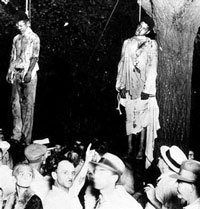Jim Crow Museum
1010 Campus Drive
Big Rapids, MI 49307
[email protected]
(231) 591-5873
I overheard a conversation between some blacks talking about all these empty nooses in the news and one of them said something about strange fruit. I'm not up on ebonics.
-- Pierre Buttons, Mesa, Arizona
Between 1882 and 1964 at least 3,400 Blacks were lynched in the United States. "Strange
fruit" is a euphemism for the lynched bodies of African Americans hanging and swaying
from trees.
Strange Fruit is also the name of one of most powerful protest songs ever written: a haunting song
made famous by Billie Holiday, the Jazz diva. In the 1930s and 1940s, when political
protest was rarely expressed in musical form, the song portrayed lynching in all of
its brutality. Here are the words to Strange Fruit:
Southern trees bear strange fruit.
Blood on the leaves and blood at the root,
Black bodies swinging in the southern breeze,
Strange fruit hanging from the poplar trees.
Pastoral scene of the gallant south,
The bulging eyes and the twisted mouth,
Scent of magnolias, sweet and fresh,
Then the sudden smell of burning flesh.
Here is fruit for the crows to pluck,
For the rain to gather, for the wind to suck,
For the sun to rot, for the trees to drop,
Here is a strange and bitter crop.

Although Holiday made the song famous, she was not the author of the heartrending
lyrics. That distinction belongs to Abel Meeropol, a Jewish schoolteacher from the
Bronx in the 1930s. Meeropol saw a gruesome photograph of the lynched and hanging
bodies of two young Black men, Thomas Shipp and Abram Smith. The photograph horrified
and sickened him. He dealt with his horror by writing the poem, "Bitter Fruit," which
was published in 1937 in The New York Teacher, a publication of the Teachers Union. Meeropol, a member of the American Communist
Party, later published it in the Marxist journal, New Masses.
In early 1939, after seeing Holiday perform at the Cafe Society, an interracial nightclub
in Greenwich Village, New York, Meeropol showed her the poem and a version that he
had put to music and had been sung by his wife, Anne. Holiday liked it and worked
with Meeropol and Sonny White to turn it into her version of Strange Fruit. But she was worried about singing it, even at Cafe Society, a place that catered
to "progressives." "There wasn't even a patter of applause when I finished," Holiday
later wrote in her autobiography. "Then a lone person began to clap nervously. Then
suddenly everybody was clapping." Her rendition made an enormous impression on that
first audience and most audiences that heard her sing the disturbing ballad. Strange Fruit became her signature song.
The lyrics are hard to read and even harder to listen to. Some listeners who had come
to drink, dance, and have a good time -- not to hear about lynched boys "swinging
in the southern breeze" -- stormed out. Some in the audiences cried because of the
simple but poignant contrast between the "scent of magnolias" and the "sudden smell
of burning flesh." Some cried because Holiday spoke the truth in song and they didn't
want to hear the truth; others because they needed someone, anyone, to tell the truth.
Still others cried because it was sad to think of any mother's son hanging like fruit
from a tree.
Of course, there were those who were angry at her for daring to sing those words;
angry at her because it is easier to be angry at the messenger than it is to change
a culture. How dare she sing about such things? But many listened, and nodded, and
applauded, and knew that she cried the truth. Holiday performed it nightly. Here is a video of Holiday singing Strange Fruit on the British Television show "Chelsea At Nine," on February 23, 1959, twenty years
after she first began singing the song.

In the 1930s it was hard to make a record that testified about racial atrocities.
Holiday asked her recording label, Columbia, to record her singing the song. They
refused. The executives at Columbia feared a hostile response by Southern record retailers
and affiliates of Columbia's co-owned radio network, CBS. Columbia did grant Holiday
a one-session release from her contract to work with Commodore Records, an alternative
jazz label. In 1939, she recorded Strange Fruit and it became her biggest seller. Singing the song reflected her pain; it also increased
her pain. Her accompanist Bobby Tucker recalled that Holiday cried each time after
she performed Strange Fruit. She cried because she knew the nooses were not empty.
Time Magazine, then a staunchly and rigidly conservative paper, called Holiday's Strange Fruit "a prime piece of propaganda" for the National Association for the Advancement of
Colored People. They were right. The NAACP had been waging a battle against the lynching
of African Americans. Strange Fruit quickly became an anthem of the anti-lynching movement and the first significant
song of the then fledging Civil Rights Movement. The song forced listeners to confront
the brutality of lynching. Although many radio stations refused to play it, enough
stations played it that the lyrics were heard by thousands. And, of course, Holiday
traveled to sing it in places where both she and the song were welcome. Strange Fruit became a memorial to the nameless, voiceless victims of hate: men and women beaten,
stripped, lashed, mutilated, burned, riddled with bullets, and left "hanging from
the poplar trees."
February 2008 response by
David Pilgrim
Curator
Jim Crow Museum